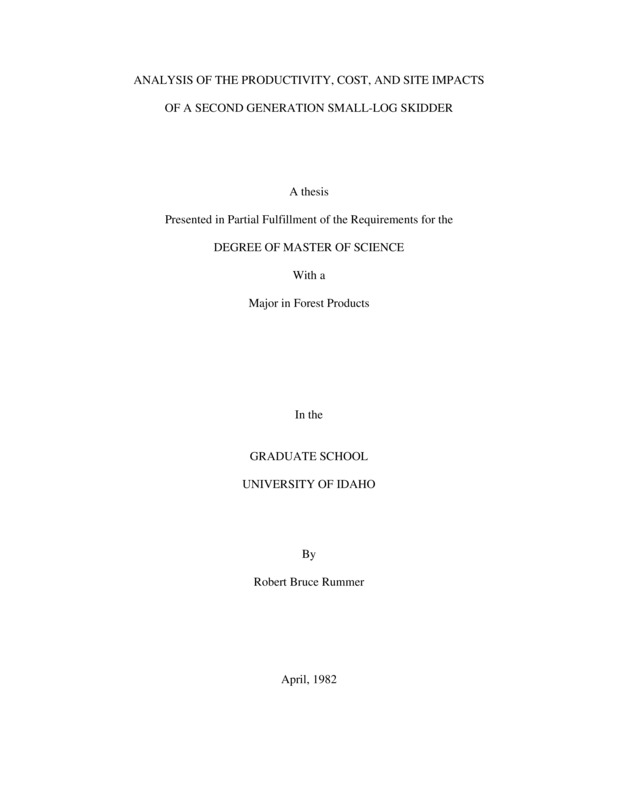PDF PREVIEW
Analysis of the Productivity, Cost, and Site Impacts of a Second-Generation Small-Log Skidder Item Info
Download Preview PDF
Please note: PDF file may not be complete document.
- Title:
- Analysis of the Productivity, Cost, and Site Impacts of a Second-Generation Small-Log Skidder
- Creator:
- Rummer, Robert Bruce
- Date Created:
- 1982-04
- Description:
- A low-horsepower, rubber-tired skidder designed for the efficient removal of thinning residues has been developed at the University of Idaho. This thesis draws on the results of two previous small-log skidder projects: a computer simulation model and testing of the original mini-skidder design. The project continues with the testing and analysis of an improved design. A 43-hp backhoe power unit was obtained and converted for skidding use. Modifications included the addition of skidpans, a safety canopy, and a small hydraulic grapple mounted on the backhoe boom. Time/motion studies of this machine in three different stands were conducted. Evaluations of soil-compaction, soil disturbance, and residual damage were also performed. Production ranged from 47.6 cubic feet per hour to 201.6 cubic feet per hour. An improvement in the grapple design led to a significant increase in hourly piece production. Delay time was reduced during the project and machine availability in the last stand was 72.2% with a static ground pressure of 9 psi, the mini-skidder caused small, but statistically significant, increases in bulk density of the upper 6 inches of the skid trails. Areal soil disturbance of the stands was limited. An average of 80% of total stand area was classified as slightly disturbed. Damage to the residual stand from skidding operations occurred on 16.5% of the residual trees. Data from the field testing were used to develop regression equations for predicting turn-time. This project shows the feasibility of using a small machine to skid thinning residues. Skidding costs were approximately $200.00 per acre. A gross profit of 110% was realized in one stand by utilizing the recovered material for post and rail products. The general simulation model developed in an earlier small-log skidder project was revised to specifically model the improved skidder design. Results of the revised model accurately predict hourly piece production, but weight and volume production statistics are inconsistent. Even in its current form, however, the revised simulation model can be a valuable tool for evaluating the influence of stand and machine attributes on skidding production.
- Document Type:
- Thesis
- Library Call Number:
- SD388.R8
- Subjects:
- Flat Creek small-log skidder skidder soil compaction soil disturbance time and motion rubber-tired skidder forest operations
- UIEF Unit:
- Flat Creek
- Location:
- UIEF
- Latitude:
- 46.851013
- Longitude:
- -116.724478
- Department:
- Department of Forest Products
- Type:
- Text
- Format:
- application/pdf
Source
- Preferred Citation:
- "Analysis of the Productivity, Cost, and Site Impacts of a Second-Generation Small-Log Skidder", UIEF Research Exchange, University of Idaho Library Digital Collections, https://www.lib.uidaho.edu/digital/uief/items/uief_0019.html
Rights
- Rights:
- In copyright, educational use permitted.
- Standardized Rights:
- http://rightsstatements.org/vocab/InC-EDU/1.0/

